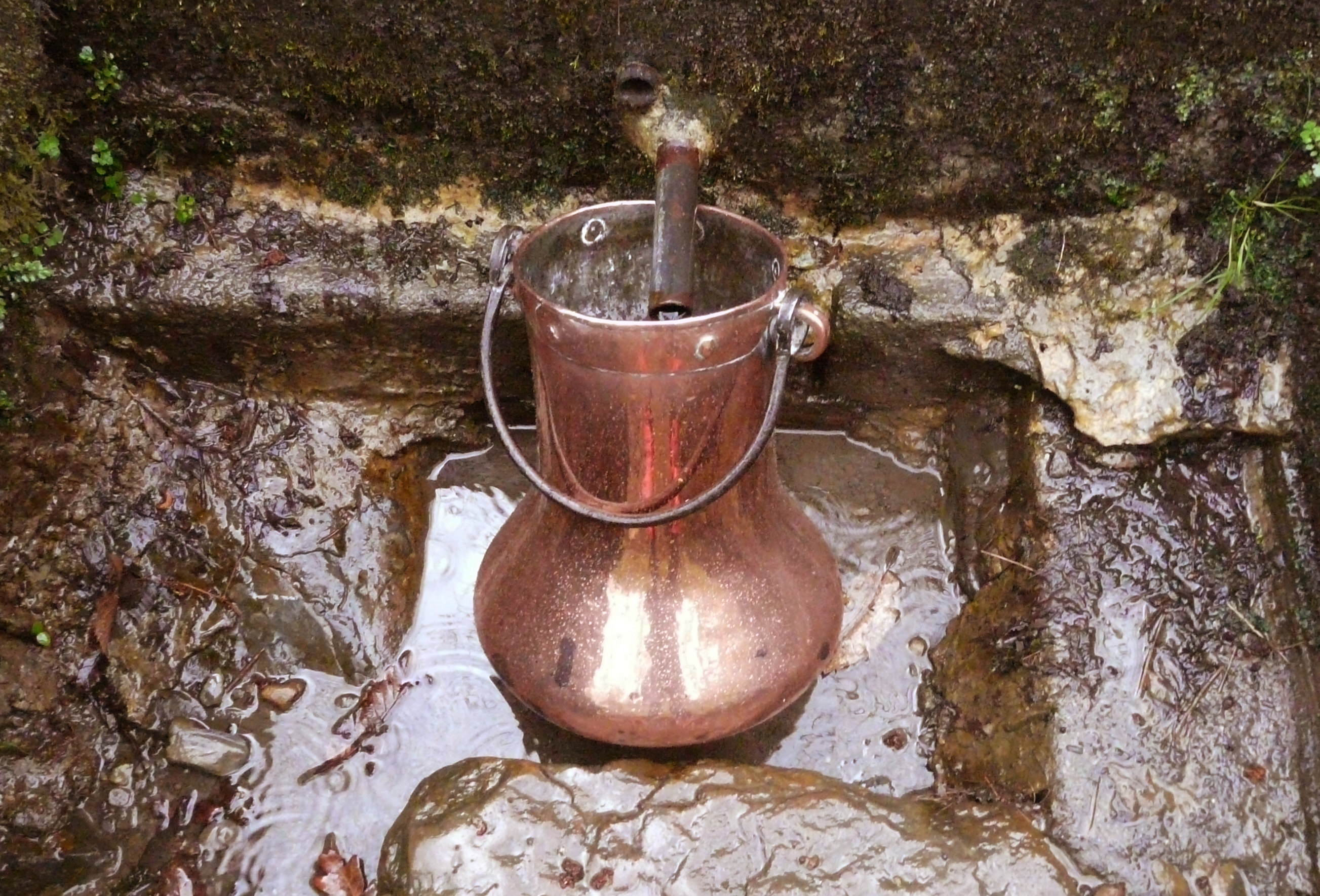Basque ethnography at a glance

Copper errada belonging to the Olabarria family from Udiaga. Orozko (Bizkaia), 2018. Itziar Rotaetxe. Labayru Fundazioa Photographic Archive.
According to the accurate definition provided by the Royal Spanish Academy, the herrada is ‘a wooden bucket with large cast iron or brass bands, wider at the base than at the top rim’, more of a museum piece than a useful object today. Most notably throughout the 19th century and the first few decades of the 20th century, this particular bucket served an important function in Basque society, for it was used by women to fetch water from the source. In western Basque dialects it is known as errada, perrada, edarra, and others, ferreta being the commonest word for it in eastern varieties.
As I recall, whoever approaches Otsagabia (Navarre), main town in the Valley of Salazar, will find antique water buckets with polished, shiny, golden metalwork decorating most entrance halls. In Donostia (Gipuzkoa), I am told, the youth turn such buckets upside down for relentless drumming on the eve of the Feast of St Sebastian.
Certainly during the 18th and 19th centuries, the colloquial Basque phrase euria erradaz egin signified ‘bucket down with rain’, as confirmed by various authors. Significant 19th-century writers use it: “edarraz euriak (egin)”, quoting Arrese Beitia, and “Goyan-bean euria perradaz bezela ari da”, reads the opening sentence of Alfonso M. Zabala’s short story called Txomin Urreta. Euria goian-behean ari da ‘rain is pouring down’ reinforced by perradaz bezala means ‘rain is bucketing down’, which is, shall we say, an idiomatic expression built on a very visual metaphor.
![Jugs and bucket of water. Eulalia Abaitua. Mujeres vascas de ayer [Basque women of yesteryear]. Euskal Museoa Bilbao Basque Museum, 1990](https://www.labayru.eus/wp-content/uploads/2018/04/2-cc3a1ntaros-y-herrada.jpg)
Jugs and bucket of water. Eulalia Abaitua. Taken from Mujeres vascas de ayer [Basque women of yesteryear]. Euskal Museoa Bilbao Basque Museum, 1990.
Although the said receptacle has fallen into disuse, similar idioms are still heard. Gotzon Garate documents in Azpeitia (Gipuzkoa) euria egin du erradaz botata bezala ‘it has rained buckets’. Now as formerly, Marina Olabarria, from Orozko (Bizkaia), uses the expression euria erradaz egin to signify ‘bucket down’. Other water vessels do likewise occur in the language to denote rain that pours down heavily. The Spanish expression llover a cántaros ‘pour with rain’, for instance, may be translated into Basque as euria suilka egin, suil meaning ‘jug, pitcher’, cántaro in Spanish.
I have heard countless times my mother, Lorenza Elorza, recount how in the old days, when there was no running water in the homes, village women from Markina (Bizkaia) would collect water from the source known as Goiko Portal. A rolled cloth placed on top of the head made a soft surface for the edarra to rest upon. In her words: “Le(h)ena ez euen urik etxietan, eta kaleko andrak, buruen sorkixe ebela, sorkixe bigungarritzat ipinitte, edarran ekarten eben ure”.
The 19th-century old saying gathered by Juan Antonio de Mogel “Otsein barrijak galbaiaz ura, zaarrari edarriaz bere lecurik emon ez gura”, which R. M. de Azkue further commented upon, translates as: ‘The young servant may carry water with a sieve, but the old is not wanted even if he carries it in an edarra’. Among the riddles collected by J. F. Cerquand and published in the Bulletin de la Société des Sciences, Lettres et Arts de Pau between 1875–1885, features the following from Zuberoa: “Üthürrialakoan khantatzen eta etxerakoan nigarrez?” ‘Singing on its way to the source and weeping when coming back home?’, the answer being the ‘ferreta’.
In the Song of Bereterretxe —one of the most ancient Basque ballads sung in Zuberoa based on certain tragic events which took place in the mid 15th century—, recovered from the oral tradition of the end of the 19th century and beginning of the 20th, verse number ten of the Chambra version refers to the great amount of blood shed by the sacrificed man: Ezpeldoiko alhaba / Margarita deitzen da, / Bereterretxeren odoletarik / bethe umen dü ferreta ‘Margarita, native of Ezpeldoi, is said to have filled a ferreta with Bereterretxe’s blood’. Better-known versions speak of handfuls of Bereterretxe’s blood.
Jabier Kalzakorta – Full member of the Academy of the Basque Language and professor at the University of Deusto
Translated by Jaione Bilbao – Language Department – Labayru Fundazioa

